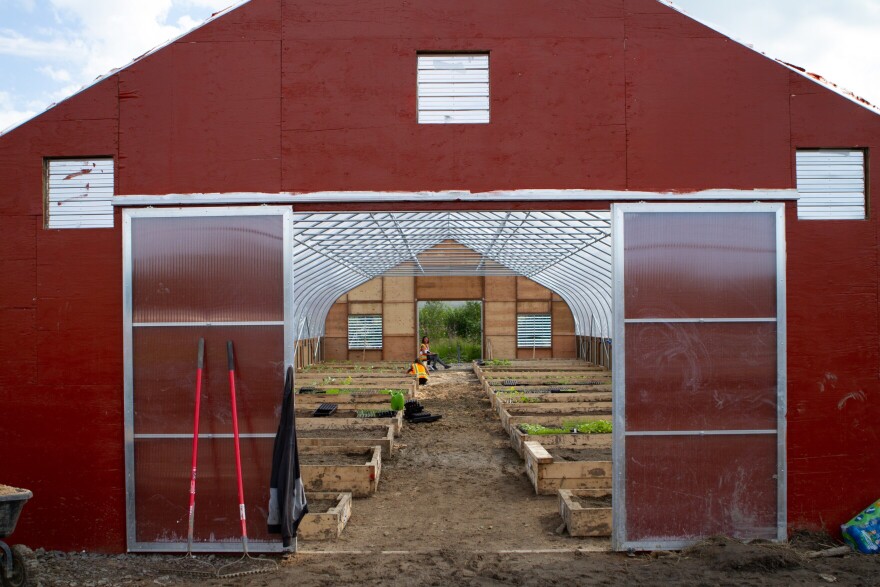Following a massive chum salmon crash in western Alaska, the only fish processing plant on the Yukon River cannot process fish for the second year in a row. To try to stay afloat, it has instead turned to new business ventures: agriculture and lumber.
Jack Schultheis is the manager of Kwik’pak Fisheries, the only salmon processor on the Yukon River. He’s been at the helm of the fish plant for more than two decades, but this year, for the second year in a row, the plant isn’t processing any fish. Instead, it’s planting and selling vegetables and milling lumber.

Last summer, when Schultheis realized Kwik’pak would not be able to operate as a fish plant, he built greenhouses instead. And this summer, he’s building more.
“We’re adding four more greenhouses. So we will have a total of eight,” said Schultheis.
In the greenhouses, Kwik’pak is planting vegetables. They’re selling them in the Kwik’pak store, and will soon begin selling them in other Yukon village stores too. He even plans to sell the vegetables to restaurants in Nome and Bethel.
“We have a lot of turnips, potatoes, tomatoes, lettuce, radishes, spinach,” said Schultheis.
He also shipped in 35 chickens from Anchorage on a Lynden cargo plane earlier this summer.
“We get about two dozen eggs every day. And they just absolutely fly off the shelves,” he said.
Schultheis said that they sell the eggs and veggies at Anchorage prices, which are much cheaper than local rural prices.
Kwik’pak also has another new venture this year: lumber. The big empty warehouses that once processed fish are now processing wood. Schultheis is purchasing spruce trees upriver from the communities of Anvik and Grayling. The money goes to the local communities, and local boaters haul the logs downriver. Schultheis has invested in mill supplies and is building a kiln to dry the wood.
Remember, all this is happening in a fish processing plant. The plant now only provides a fraction of the jobs it used to.
Through these new programs, Schultheis has been able to keep 15 of his regular summer employees. Previously, the plant provided about 750 jobs. Kwik’pak’s employment crashed along with its chum runs.
Last summer, Kwik’pak was forced to stop selling salmon after the summer chum population on the Yukon River suddenly shrank to less than a tenth of its usual size. It was the lowest run ever. This summer the population has ticked up to twice that, but it’s still the second lowest run on record.
Kwik’pak’s revenue shrank along with the runs. Schultheis said that the plant typically raked in $10 million to $15 million per season from selling fish. He’s hoping that as the gardening picks up, the greenhouses will help ease some of the financial losses.
Throughout the changes, Schultheis has been able to save another cross-section of workers: teenagers. Schultheis is particularly proud of the company’s Youth Employment Program. Each summer a few dozen high school-aged students from Emmonak and neighboring villages travel by boat each morning to the fish plant. He said that this kind of job training is great for their career and social development, and for their self-esteem. The teenagers plant and harvest the veggies in the greenhouse.
“It's rewarding for me because you feel like you're accomplishing something. Something with the next generation here,” Schultheis said.
Schultheis said that although he’s been able to provide some jobs and relief in the region over the past two summers, it’s not much. He said that Kwik’pak’s new lumber and agriculture programs will never be able to provide the same amount of local jobs as fishing once did.
“I don't think we would ever get to those employment levels,” said Schultheis.







